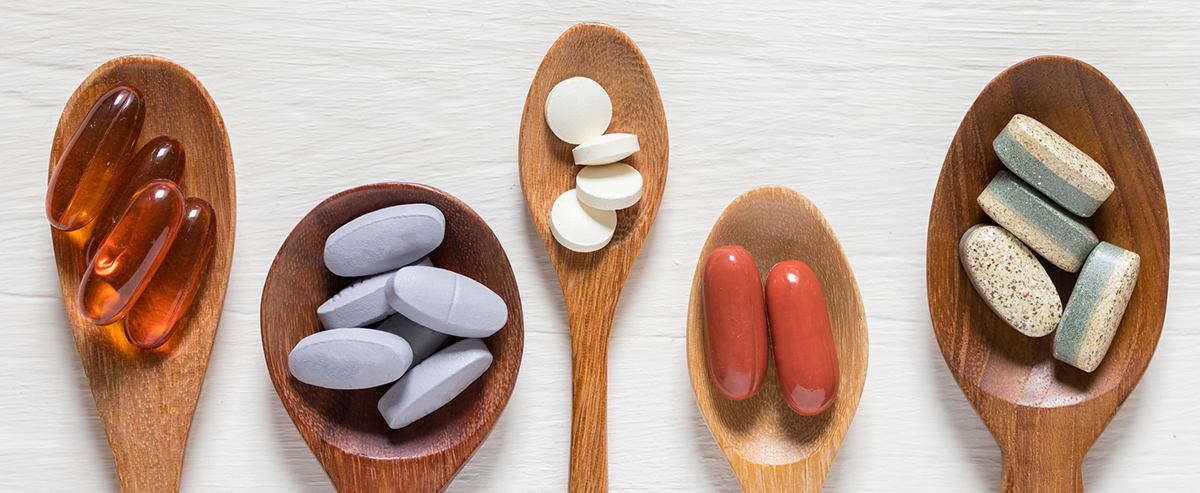Taking vitamin supplements has long been recognized as a great way to improve your physical health. After all, even if you eat a healthy diet full of nutrient-dense foods, there are still some vitamins and minerals you might not be getting, or some you need just a little more of to be at your healthiest. For example, many individuals take fish oil supplements if they do not consume salmon and other oily fish regularly. Fish oil is high in omega-3 fatty acids, which is known to promote heart health, reduce inflammation, and improve healthy brain function. If you know you aren’t eating fish at least twice a week, fish oil could be a useful supplement.
Check out our Wellness Wednesday series.
While it’s common knowledge that vitamins promote physical health, fewer people know that the vitamins and minerals entering our bodies affect our mental health, too. When it comes to health and nutrition, it is truly impossible to separate our minds from our bodies. The two are inextricably linked — when one is neglected, the other may suffer. Taking vitamins that support a healthy body can also support mental health and brain function.
When our bodies experience certain vitamin deficiencies, it can cause our organs to grow weak and work less effectively. When our organs aren’t functioning properly, we are more likely to develop various conditions and ailments which can drastically affect our well-being, both physical and mental. The brain is an organ too, and it requires certain nutrients to function. There are several important vitamins and minerals that support the body’s biochemical reactions and promote the healthy function of brain cells and neurotransmitter pathways.
What are neurotransmitters?
Neurotransmitters are the chemical messengers of the brain.
A vitamin deficiency of any of these important nutrients could negatively impact both physical and mental health. Micronutrients have a powerful effect on the body and have many health benefits. For lots of people experiencing depression or other mental health disorders, there are several natural supplements for mental health which could be helpful when combined with the right medication and psychotherapy.
The Best Vitamins for Mental Health
Depression is a mood disorder affecting over 17 million people in the U.S. today, and that number only reflects the reported cases. There are far more people experiencing depression who don’t seek treatment. Depression is typically treated with medications and psychotherapy. However, some lifestyle changes can help treat and prevent depression as well, including the regular consumption of certain vitamins, minerals, and herbs. Some common vitamins known for improving mental health and supporting brain function are:
B Vitamins
B vitamins are some of the best vitamins for mental health. B vitamins are known for their mood-altering properties. They can help fight fatigue, improve your memory, and allow you to function all-around with more clarity. Deficiencies in B vitamins, including Thiamine (B1), Riboflavin (B2), and B12, can lead to depression, anxiety, fearfulness, and irritability.
B12 and folate (B9) are important vitamins for maintaining a healthy nervous system. Vitamin B12 and folate are needed for producing norepinephrine, serotonin, and dopamine. Norepinephrine and serotonin are neurotransmitters in the brain which influence mental behavioral patterns and moods. Dopamine is another type of neurotransmitter that contributes to feelings of pleasure, motivation, achievement, and stimulates your natural reward center. Low levels of either of these chemicals can lead to depressive symptoms.
Eating a diet of vitamin B-rich foods, as well as taking daily supplements could improve mental health, may help improve mood, and reduce depression and anxiety in many individuals. Foods like fish, lean pork or beef, poultry, eggs, whole-grains, nuts, and milk are high in B vitamins.
Vitamin C
Vitamin C might just be the most “mainstream” or well-known of all vitamins. Many people are aware of vitamin C and its immune-boosting properties. Even those of us least familiar with the different vitamins and their uses are likely to take a vitamin C tablet or drink a glass or two of orange juice when we feel cold or flu symptoms coming on.
What fewer people know is that vitamin C also plays an important role in mental health. While the link between vitamin C and mood might be surprising, many people who are deficient in vitamin C experience depression and chronic fatigue. Conversely, even people with normal vitamin C levels in their system found that taking additional vitamin C improved their mood and cognitive function. Some research has also shown that vitamin C can help lower anxiety symptoms.
Taking vitamin C supplements and eating plenty of fruits and vegetables high in vitamin C, like citrus fruits and red peppers, can have an impact on mood, energy levels, and anxiety. However, if you are taking oral vitamin C supplements, make sure to stay within the 2,000 milligrams recommended daily amount.
Vitamin D
Vitamin D is another great natural supplement for mental health. Vitamin D contributes to healthy brain function, among other health benefits. Studies have shown that when tested, many people experiencing depression are also experiencing lower-than-normal vitamin D levels. On the other hand, people with low levels of vitamin D in their system are more likely to experience bouts of depression, anxiety, and other mental conditions than other people with normal levels of vitamin D.
Sunlight is the primary source of vitamin D for most people. People living in warm, sunny places are less likely to have vitamin D deficiencies. Conversely, people living in more northern climates, where the sun is scarce for months at a time, are more likely to be vitamin D deficient due to low sun exposure. Vitamin D deficiency is common amongst people who are suffering from seasonal affective disorder (SAD). If you experience more depressive symptoms during low sunlight months, vitamin D supplements could be especially beneficial.
Zinc
Micronutrient and mineral deficiencies are a huge problem worldwide and can lead to numerous health conditions, including depression. Zinc is a mineral found throughout the human body, as well as in other animals. Meat, poultry, legumes, dairy, and whole grains all have relatively high levels of zinc.
Zinc is an essential trace element related to many biological and biochemical functions, including the immune system and metabolism, as well as brain growth and development. Research has shown that low zinc levels can lead to reduced brain function and other behavioral disturbances. Taking zinc supplements can be effective in reducing depressive symptoms, especially in women. Some studies have shown that when combined with the proper medication, zinc has positive effects in treating ADHD. Zinc is especially effective in treating mental health conditions and depression when combined with magnesium.
Magnesium
Magnesium is another important mineral found in the human body which is critical in regulating and calming the nervous system. Increased magnesium intake can reduce depression, premenstrual syndrome in women, and hypertension in children with ADHD.
Several studies have shown that low magnesium levels are linked to depression. While more research is needed before we can understand exactly how and why magnesium affects mental health, one possible reason is that magnesium regulates gut microbes, which are linked to the hippocampus. Taking magnesium supplements can help regulate unhealthy gut microbes which contribute to depressive symptoms.
Omega-3 Fatty Acids
Omega-3 fatty acids are found in most fish and some marine algae. However, they are most prevalent in oily fish like salmon, herring, and sardines. Scientists started researching the effects of omega-3 fatty acids on mood disorders when they discovered that depression is less common in nations that traditionally eat a diet rich in fish. Fatty acids can easily travel through cell membranes where they can interact with molecules responsible for regulating mood. They also improve cell membrane fluidity and influence neurotransmitter function, all of which contribute to an improved mental state.
Saffron
Saffron is a brightly colored, fragrant spice commonly used in Middle Eastern and Indian cuisine. It is made from the dried petals of a flower called the Saffron Crocus. Saffron has been shown to boost levels of the mood-enhancing neurotransmitter, serotonin. Supplementing with saffron can significantly reduce symptoms of depression by increasing serotonin levels. However, more research is needed to understand the full scope of saffron’s ability to treat mental health conditions.
Holistic Mental Health Care at Sage Neuroscience Center
At Sage Neuroscience Center, we understand that mental health is different for everyone. Each individual is unique and deserves custom treatment. Having knowledge and access to a variety of treatment options is crucial, and so is educating yourself about the various lifestyle changes that might positively affect your mental health. To learn more about how vitamins and other natural supplements help improve mental health, contact the team here at Sage Neuroscience Center.
*Editor’s Note: This post was originally published Published on: Feb 4, 2014 and has been updated Mar 11, 2021

Bryan Krumm is a Mental Health Nurse Practitioner whose goal is to provide evidence-based treatment, according to the best standards of practice, utilizing the most current research to maximize therapeutic outcomes and incorporating the patient as an active part of their care. Bryan is particularly interested in PTSD and medical cannabis. Outside of work, Bryan is into music, politics, and philosophy.
Read Bryan Krumm’s Full Bio | Browse All Articles Written by Bryan Krumm




